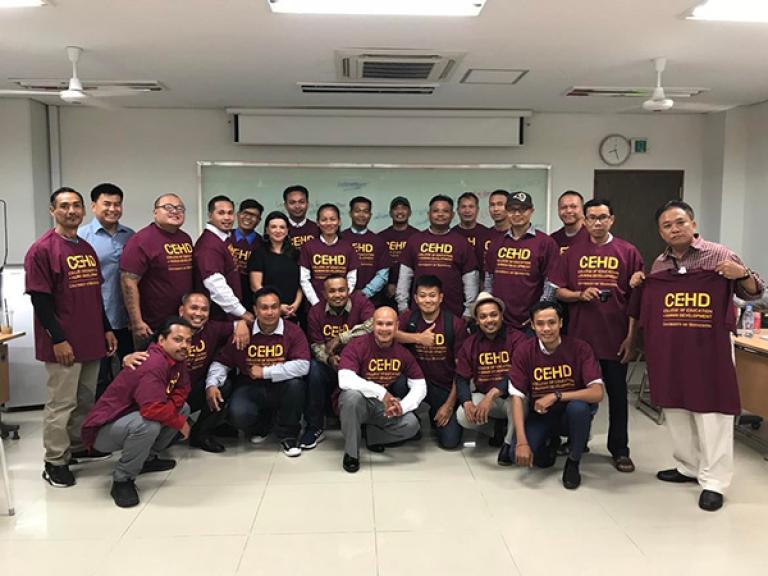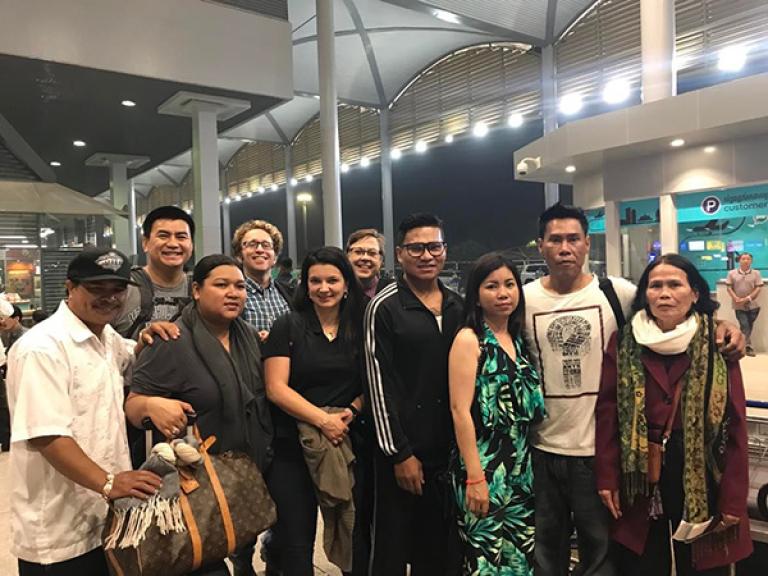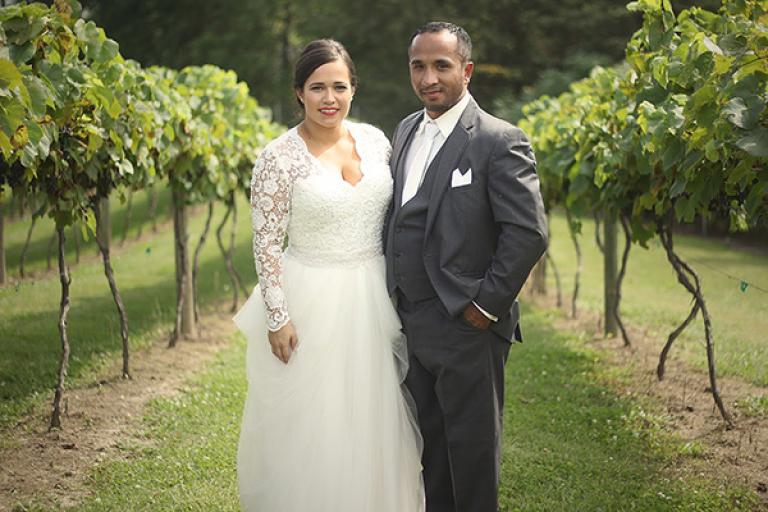News

CEHD’s Cambodian connections
Initiative to support deported Minnesotans leads to a hub of interdisciplinary engagement.
In January 2018, Department of Curriculum and Instruction Associate Professor Vichet Chhuon, International Initiatives and Relations Director Marina Aleixo, and Department of Family Social Science Professor Catherine Solheim traveled to Cambodia in Southeast Asia. The trip was part of a grant-funded project to examine transnational family separation that resulted from U.S. immigration policies. “We traveled with several family members whose loved ones had been deported to Cambodia,” Chhuon says.
CEHD’s engagement with this issue began back in 2016 when eight Cambodians living in Minnesota were detained by Immigration, Customs, and Enforcement (ICE). Of the eight, three were released back to their families and five were deported to Cambodia. One of those released was Ched Nin, who grew up in Faribault, Minnesota, after arriving in the United States when he was six years old.
 |
 |
“His wife, Jenny Srey, worked closely with CEHD, faculty at the U’s Law School Center for New Americans, and community organizers to help win the release of her husband in February 2017,” Chhuon says.
Securing Nin’s release was not an easy task. Srey, a 2006 Family Social Science graduate and currently a senior manager with the Coalition of Asian American Leaders, had reached out to Chhuon—the only Cambodian professor in Minnesota she knew—and later to Aleixo for guidance and support. “They were part of the campaign, helping us fight for our loved
ones,” Srey says.
Srey also helped co-found Release MN8, a group established to support the eight individuals in ICE custody.
Although Srey and her husband eventually had a happy ending as he was released, the same could not be said for five of the other MN8 and many other Cambodians from around the United States who now found themselves in a “homeland” that they have never really known. “Almost a thousand individuals who came to the U.S. as refugee children had been deported who were now in their 30s. Most of them came here as young children,” Srey says. “They are familiar with American culture. Most of them identify as Americans and may not speak Khmer, the primary language in Cambodia. They think and have dreams in English, not Khmer.”
Plucked from their homes and placed in this new situation with no idea if they will ever see their family members again, the deportees were experiencing the very definition of ambiguous loss. Coined by Department of Family Social Science Professor Emeritus Pauline Boss, ambiguous loss means loss without closure, which makes it much more difficult to move on in those kinds of situations.

Jenny Srey worked closely with CEHD, faculty at the U’s Law School Center for New Americans, and community organizers to help win the release of her husband, Ched Nin, in February 2017. Nin had been detained by Immigration, Customs, and Enforcement and was facing deportation to Cambodia.
Researching the effects of this ambiguous loss is what brought Chhoun, Aleixo, and Solheim to Cambodia in early 2018. The trip was funded via a Global Signature Grant, a CEHD award given to a project with global—ideally interdisciplinary—engagement.
“We looked at the ambiguity of deportation and losing one’s family and American identity,” Solheim says of the project. “These young men do not know Cambodia; it was not their country. It was heartbreaking to listen to their stories of loss.”
Solheim says there was a sense of “not belonging” with many of the deportees. “Am I really an American? I’m not a Cambodian. So where do I belong?” she says. “It’s very difficult to watch them go through that.”
The Journal of Immigrant and Refugee Studies recently published an article on the team’s work and Chhuon recently completed a book chapter collaboration with Srey and Nin. Beyond the research, however, the team knew more could be done.
“Our work as scholars and advocates focused on ways to support the resettlement of these individuals in Cambodia,” Chhuon says. “Across four years, we have conducted several rounds of teacher training workshops for those who are interested in teaching English in Cambodia. Teaching provides individuals with respectful and stable employment that leveraged a valuable asset—the English language.”
“What was really important is that they knew how to speak English,” Srey says. “It’s a huge need in Cambodia to learn to speak English and there’s not a lot of teachers there.”
In addition, a lot of the deportees tried to start their own businesses, but lacked a solid entrepreneurial background. “During the pandemic, we held Zoom sessions that focused on small business ideas for deportees,” Chhuon says.
The collaboration has also included mental health support for individuals in Cambodia and their families in the U.S. “In 2019 we organized group meetings to provide emotional support for deportees in Cambodia, later we moved these gatherings online because of COVID,” Aleixo explains.
The sustainability and growth of all these projects is due to CEHD’s strong relationship with Khmer Vulnerability Aide Organization (KVAO), a local humanitarian organization that supports Cambodian American deportees in Cambodia.
Today, Cambodia is a hub for CEHD’s international engagement, spanning multiple disciplines and departments. Other faculty and alumni who are involved with Cambodian initiatives include Professor Bhaskar Uphdayay (Department of Organizational Leadership, Policy, and Development), Professor Liz Weiling (formerly Department of Family Social Science, now at the University of Georgia), and Professor Sachiko Yokoi Horii (CEHD alumnus now at Osaka University, Japan).
“Our engagement has contributed to meaningful employment and increased visibility and respect for this marginalized community in Cambodia,” Chhuon says.
This past July, Chhuon was in Cambodia working with two graduate students as part of the Mary T. Scholars Program. These students are part of an inaugural cohort to work and learn with organizations that support the resettlement of deported Cambodian Americans.
“Cambodia is a critical site for CEHD; it represents so much of what we hope to stand for: Bringing together local and global communities, advocacy and social justice, interdisciplinary collaboration, and alumni connections,” Aleixo says. “It’s amazing that one site reflects so many of our values and priorities.”
-KEVIN MOE